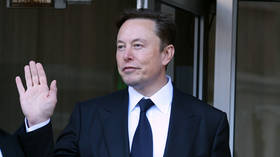Pentagon discloses military deal with Elon Musk
The billionaire entrepreneur continues to insist that the Starlink network should not be a “participant to combat”
SpaceX has signed its first contract with the Pentagon to provide satellite services as part of its new ‘Starshield’ program. CEO Elon Musk described the effort as a military alternative to the “civilian” Starlink system, although it will apparently rely on the existing constellation of satellites.
In a post on X (formerly Twitter) on Wednesday, Musk weighed in on reports that SpaceX had reached a deal with the US Space Force, confirming that the Starshield project would be “owned by the US government and controlled by [the Department of Defense].”
“Starlink needs to be a civilian network, not a participant to combat,” he said, referring to the use of the satellites in Ukraine throughout the conflict with Russia, adding “This is the right order of things.”
However, despite Musk’s stated reluctance to be involved in the fighting, the new Space Force contract will see SpaceX effectively lease out part of its Starlink network to the Pentagon, providing service over the same satellites, according to Bloomberg.
With a $70 million price ceiling, the deal “provides for Starshield end-to-end service via the Starlink constellation, user terminals, ancillary equipment, network management and other related services,” Air Force spokeswoman Ann Stefanek told Bloomberg News.
The outlet noted that Musk’s aerospace firm is now competing for nearly $1 billion in Pentagon contracts extending into 2028, as the Space Force seeks to repurpose existing communications satellites for military use as part of its “Proliferated Low Earth Orbit” program.
Musk has come under fire from US officials for SpaceX’s decisions in Ukraine, after allegedly refusing Kiev’s demands to use the Starlink network to aid strikes on Russia’s Black Sea fleet last year. The billionaire’s biographer, Walter Isaacson, revealed earlier this month that Musk had developed a “military version of the Starlink” as a way to wash his hands of the project.
“I’ve talked to him during this whole thing, and late one night, he said, ‘Why am I in this war?’ He said, ‘I, you know, created Starlink so people could chill and watch Netflix movies and play video games. I did not mean to create something that might cause a nuclear war,’” the author recalled in comments to the Washington Post.
Isaacson went on to say that Musk “decided to sell and give total control over a certain amount of Starlink equipment… to the US military so that he no longer controls the geofencing,” referring to geographic limitations that can be imposed on the satellite network.
Musk previously claimed that American sanctions on Russia had prevented SpaceX from extending Starlink coverage into Crimea, insisting the company is “not actually allowed to turn on connectivity to… the country without explicit [US] government approval.” However, he has also said that he did not wish to be “complicit in a major act of war and conflict escalation,” suggesting the decision was not solely due to US restrictions.







Comments are closed.